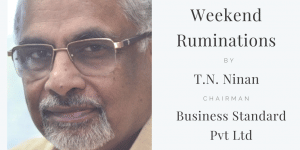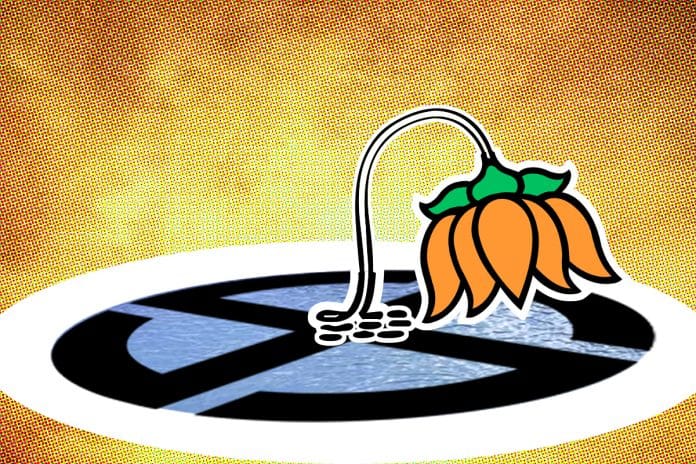One should not underestimate the fighting power of the Modi-Shah duo, but 2019 now looks like a real contest
The results of 10 Lok Sabha by-elections held in the last eight months make one thing clear: It is not just the coming together of the non-BJP (Bharatiya Janata Party) parties that has reduced the BJP’s tally to a solitary seat out of the 10, a sharp contrast to its victory in eight out of the same 10 in the 2014 Lok Sabha elections. Opposition unity has been a necessary factor, but on its own that would have made little difference to the by-election outcomes. Defeat for the BJP needed a second development: Significant erosion of the party’s vote base. Equally, the BJP could have won, even with an eroded base, if the opposition had remained divided. Each therefore was a necessary but not sufficient condition for the BJP to lose. It is the combined effect of the two factors that has made the difference.
In six of the 10 seats, the BJP in 2014 enjoyed not a plurality but an absolute majority, i.e. more than 50 per cent of the votes cast. In another two seats, the party’s vote share was only marginally short of the halfway mark, having secured 48.7 per cent in Phulpur and 46.3 per cent in Gurdaspur. Opposition unity in 2014 would have made little or no difference to the results in these and similarly-placed seats, since their combined vote share would have been less than half. It follows that if the BJP had retained its 2014 voting base today, even the combined opposition would have made little impact in the by-elections of the last eight months.
 Such analysis must be approached with caution. By-election results tend to go against the party in power, and are unlike general elections in that local issues tend to hold greater sway (like the grievances of sugarcane growers in Kairana). Often, the government’s big guns do not go out to campaign. Still, the BJP’s loss of vote share since 2014 is striking. In Alwar and Ajmer, both in Rajasthan, the party’s vote share has shrunk by 35 per cent and 20 per cent, respectively; in Gurdaspur by 22 per cent. The loss of vote share has been relatively small in Gorakhpur (9 per cent), hence its loss to the Samajwadi Party was also by a relatively small margin.
Such analysis must be approached with caution. By-election results tend to go against the party in power, and are unlike general elections in that local issues tend to hold greater sway (like the grievances of sugarcane growers in Kairana). Often, the government’s big guns do not go out to campaign. Still, the BJP’s loss of vote share since 2014 is striking. In Alwar and Ajmer, both in Rajasthan, the party’s vote share has shrunk by 35 per cent and 20 per cent, respectively; in Gurdaspur by 22 per cent. The loss of vote share has been relatively small in Gorakhpur (9 per cent), hence its loss to the Samajwadi Party was also by a relatively small margin.
Where the BJP can take some solace is in West Bengal, wherein the Uluberia constituency it has effectively displaced the Communists as the principal opposition to the Trinamool Congress. In 2014, the Communists had garnered two-and-a-half times as many votes as the BJP. Now they are a poor third. It is also noteworthy that in Kerala’s Chengannur assembly constituency, the BJP though coming in third is not all that far behind the Congress in second place. The Congress of course presents a truly sad picture, despite having won three of the 10 seats — Gurdaspur and two in Rajasthan. Elsewhere, in constituency after constituency where about a million people voted, the Congress vote tally has failed to clear even the 25,000 mark. Take a look at its numbers in some of the constituencies: 18,858, 19,353 and 23,109. In Palghar, the party has come in fourth.
The 10 constituencies where by-elections have been held are in states that between them account for 235 Lok Sabha seats, more than 40 per cent of the total. As samples go, this may not be a decisive indicator. On the other hand, the results are from six different states where the BJP is a strong presence, while in Karnataka the coming together of the Congress and the Janata Dal (Secular) could deny the BJP many of the 17 seats it won in 2014. One should not underestimate the fighting power of the Modi-Shah duo, but 2019 now looks like a real contest. It will not be a repeat of 2014 if the BJP has to deal with erosion of its already low vote share of 31 per cent, and also faces a united opposition.
Note: This analysis excludes the results of the Nagaland and Srinagar by-elections, both won by local parties that don’t have a larger national relevance.
By special arrangement with Business Standard.







A second term in Delhi has been as rare as an absolute majority. It needs to be earned by a combination of good governance and strong economic growth. The all consuming passion to fight and win each election has come at the cost of effective, thoughtful governance. That some remorseless will to power has brought the opposition together in a desperate act of survival. 2019, notwithstanding the hype created by a media that often becomes a cheergirl more than an umpire, was never a done deal. It is looking iffy now.
Mr. Ninan’s article is silent on important facts such as oppressive attitude towards minority, SC/ST, Farmers and other working class people. People are not at all happy on the sudden imposition GST and Demonitisation.
Atrocities of RSS and rapes are real debatable issues. Mr. Ninan can very well understand that BJP nor its Government do not enjoy presently people’s confidence, sympathy and faith due to negligence and over confidence. Had he contemplated the present political scenario of our country he would not have suppressed all the above factors while in writing a piece in The Print.
Public anger against PM due to severe price hike in all counts and unemployment etc. are also main factor behind the scene. Actually all parties standing in same row, Congress involved in explicit corruption while BJP in implied. Now eager hope of public can’t satisfied by any party.